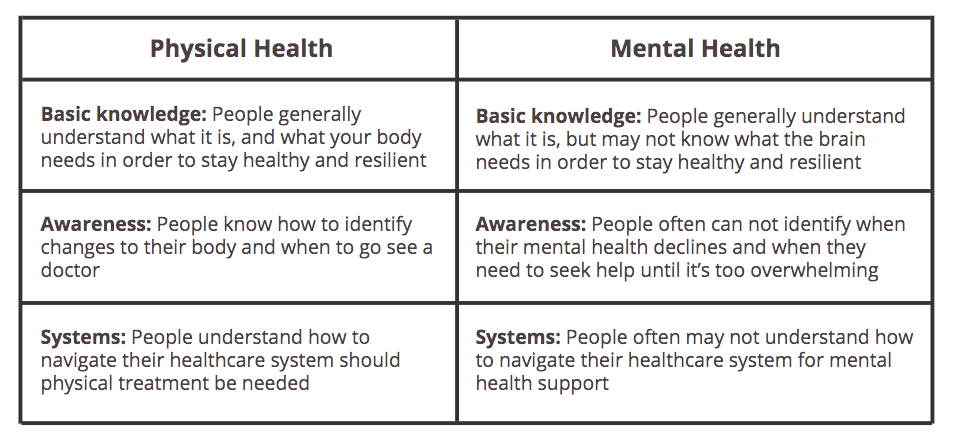Mental fitness is defined as a state of well-being and having a positive sense of how we feel, think, and act.
It means keeping your brain and emotional health in good shape. It doesn’t mean acing a test or practicing memory games or thinking puzzles, but rather exercises that keep you mentally well and build up your resilience to stress.
The concept of mental fitness has only emerged in the past few years, and is meant to help people understand that like physical fitness, mental fitness is just as important and should not be neglected within our society. It helps people understand that just as we can improve our physical health by moving our bodies, we improve our mental health by strengthening our minds.
Just as it’s easy to opt for the couch rather than exercise, it’s also easy to feed negative thoughts and behavior patterns that aren’t good for you and evoke feelings of sadness, worry, and anxiety.
We’re more likely to get sick when we don’t exercise or nourish our bodies with proper nutrition. Similarly, when we don’t practice healthy cognitive practices, the more likely it is for our mental fitness to decline.
What is mental fitness?
As mentioned before, mental fitness is defined as a state of well-being and having a positive sense of how we feel, think, and act, like how physical fitness refers to the ability of your body systems to work together efficiently to allow you to be healthy and perform activities of daily living.
With physical health, every one of us is prone to certain conditions given our family history and environment or has certain goals we wish to achieve when it comes to being physically fit. For example, if your family has a history of heart disease, goals of yours may include having a healthy diet, regular exercise, keeping cholesterol and sugar levels low, etc.
The same mentality can be applied to mental health. We are all prone to certain conditions depending on our family history and environment, however many of us may not think to set goals to ensure they stay mentally fit. For example, if your family has a history of anxiety, goals of yours may include journaling, meditation, regular sleep, and keeping stress and anxiety levels low.
Just as there are four components to physical fitness—cardiovascular endurance, strength, flexibility, and a healthy weight—there are also four components to mental fitness. These are:
- Emotional: Self-acceptance, self-esteem, resilience, and the ability to manage overwhelming emotions.
- Social: Friends and support network as they bring companionship, inclusion and enrichment to our lives.
- Financial: Low levels of stress due to money issues, feeling in control of your finances, being able to handle financial setbacks, and being on track to achieve your financial and life goals.
- Physical: Healthy diet, regular exercise, and enough sleep to reduce your risk of developing chronic illnesses such as diabetes, cardiovascular disease, and depression.
Currently, there are enormous literacy gaps around mental health and fitness compared to physical health and fitness.

Taking steps to build your mental fitness enhances your ability to cope with stress and improves your physical health, productivity at work, relationships, and overall happiness.
How does Mental Fitness help?
It’s about strengthening the neural pathways that lead to the most realistic and objective thoughts. It’s about breaking patterns so that you experience positive emotions more regularly than negative ones. If you’ve been viewing life events through a glass half-empty lens, it can help.
The more we feed negative thoughts and behaviors, the more likely they will occur. This is due to the neuroplasticity of our brains. Science has proven that humans have an enormous capacity to constantly rewire our brains throughout our lives. Thoughts that evoke certain emotions cluster together via neural pathways. This means that every time we allow a negative thought to repeat, it strengthens. It seeks to strengthen neural networks that make you feel mentally healthy.
When you are mentally fit, you recognize that you have a choice around how you react to a given situation or your circumstances. With mental fitness, you have the ability to pause, stay calm, and respond in the way you would like at the moment, rather than expressing feelings of anger, frustration only to regret it later on.
With mental fitness, you’ll feel more confident, resilient, and energized. Although life can naturally cause you to feel sadness or worry, strengthening your mental fitness will make it more difficult for sadness to progress to depression and worry to spiral into anxiety.
How does Mental Fitness work?
Our brains carry thoughts along neural pathways. These pathways are like ruts that have been created and reinforced over time. If you always take the same route to work, you may notice that you can get there on “autopilot.” When we repeat a certain thought pattern many times, that neural pathway is reinforced, and the thinking becomes automatic.
The issue with being on autopilot and having automatic thinking is when it causes us to react in ways that are unhelpful in the current situation. Our reactions are based on well-worn pathways to past emotions or triggers. While a daily routine can be good, when it comes to our thought patterns, we need to be aware of what our routines are and what pathways we’re reinforcing.
Automatic thinking comes from our brain’s tendencies to look out for danger in order to help us survive. It is constantly scanning the environment for threats and has been throughout our human evolution, which has been very helpful. But in today’s modern world, it can also raise thoughts and actions that hurt us, too.
Luckily, our minds can be rewired to reverse harmful neural pathways that aren’t serving us. With the same deliberateness that we strengthen certain muscles, we can create neural pathways that better serve us and benefit our lives. This is the essence of what we mean by mental fitness training.
What are the benefits of Mental Fitness?
When you go to bed after a long day, your body begins to relax. But the mind doesn’t always follow.
By building mental fitness training into your life, you have a greater chance of lowering your symptoms of stress, anxiety, burnout, and depression. It also often helps you achieve a sense of peacefulness through guided imagery and mindfulness strategies. These practices can reduce tension in both your body and your mind by helping you break unhelpful thought or mood patterns.
Developing the skills for better mental fitness can benefit you and everyone around you.
- Being more present: In a more present state, we can better retain and process information, listen, and be aware of, without being sabotaged by distractions.
- Ability to respond instead of reacting: When we have more control over our automatic thoughts, we can choose to respond in a more rational and less emotive way.
- Improved cognitive functioning: Better focus, processing speed, memory, concentration, time management, and communication have a positive impact, personally and professionally.
- Increased Positivity: With increased awareness comes the ability to notice and reframe thoughts in more helpful ways. This often results in kinder thoughts, compassion, and optimistic mindsets.
- More confidence: By reframing our thoughts and our beliefs about ourselves, it can lead to more confidence, self-compassion and empathy.
- Skills building: By doing mental fitness training, you can develop life skills to better manage your mental health including thought balancing, goal setting, mood management, etc.
- Improved sleep: As with physical fitness, mental fitness also contributes to better quality sleep.
How can you build your mental fitness?
Building your skills for better mental fitness at its core is all the strategies, skills, and tools that help you feel better.
There are four main areas:
- Understanding where your mental health is at
- Awareness of your patterns
- Behavior strategies that improve your mood
- Thought strategies that build balanced thinking
Understanding where your mental health is at
Like with a physical illness, it’s important to understand the patterns, behaviors that are impacting our physical health. For a physical illness, your doctor may perform a check-up by asking you a set of questions to assess what’s causing your physical symptoms. It is the same thing with mental health. Your therapist or psychologist would ask you a set of questions to assess your stress, anxiety, depression levels. They will then begin to help you understand the patterns and behaviors that are causing you mental distress. Online assessments are readily available should you wish to understand where your stress, energy, anxiety, depression, and resilience levels are at.
Awareness of your patterns.
Have you ever noticed a downward spiral in your thoughts and moods when you are stressed, worried, stressed, or angry? Mood shifts can come in rapid waves or huge tsunamis.
Whenever we have a moment of joy or sadness, there is always a reason we feel the way we do. Until you are aware of those reasons, you can’t do anything to change them. Building your self-awareness is often one of the first steps to improving your mental fitness. It includes any strategies or tools to help you understand or unpack how you feel.
Tracking your moods is often a great way to see a relationship between how we felt and what was happening at the time. When we felt down, we can ask ourselves why we felt down, or if we felt calm, we can ask ourselves what prompted that feeling. It’s easier to look back at a mood and identify the trigger and reactions after the intensity of the mood has come down, rather than in the moment when we’re feeling overwhelmed.
The frequency and intensity of our mood shifts form patterns describing how we feel day to day or week to week. By examining these patterns, we can discover consistencies which we can compare to our behavior, physiology, or thoughts to determine how they are connected to our triggers and reactions.
For example: if we started most days feeling down but feel better after breakfast, eating breakfast could be a behavioral trigger that changes our physiology by giving us energy, which improves our mood. However, if we skipped breakfast, what would happen two, three, or five hours down the road? How would we feel? We might feel hungry, irritated, or distracted. There are many different patterns we might experience, but our goal is always to figure out the logic behind our feelings.
Consistently low valleys without much variation could be a sign that we’re having difficulty recharging our battery, or that we’re dealing with a prolonged stressful situation. Sudden upswings could be a sign we’re doing something right – but if they drop off right away, we might be having trouble sustaining them.
When we’re looking at these patterns, it’s important to examine the triggers for both positive and negative mood shifts. Whatever caused even a slight shift could be the first step in a more dramatic trend. The key is that the more we track our moods and the more we are aware of our triggers, the easier it will be to make meaning of our emotions and break unwanted patterns.
Behavior strategies
Our moods, behaviors, thoughts, and physiology are all connected, so when we make a positive change to one, it can create similar changes in another. Behavioral strategies are one way to make positive changes that can help improve your mood. It includes any strategies that help you relax, feel better, or give you a sense of accomplishment.
Common activities that reduce distress include reading, going for a walk, having a bath or shower, setting a small goal, engaging in a sport or hobby, or spending time with someone.
No different than taking a break in between physical workouts, your brain also needs time to relax and recharge. Many of us may be afraid of downtime and its impact on our productivity, but the truth is relaxing and recharging our batteries increases our focus, creativity, and energy so that we can be more productive and efficient.
Relaxing and recharging will look different for everyone. Some like cozying up to read a book, cooking, taking a hike, playing games, but the fundamental is the same; it’s about doing activities that help us take our minds off our daily stressors. The more sleep we get, the more it improves our memory, mood, creativity, and problem-solving skills.
Breathwork is a powerful technique that you can access anywhere — by slowing down and deepening the breath, it can help calm the mind, reduce blood pressure, improve memory, and lower negative emotions.
It will be important for you to spend some time noting any behavioral strategies that may work for you. Remember, these are activities that make you feel more positive. So your list will be different from anyone else’s. The more activities you can identify, the more options you’ll have when your level of distress increases.
Thought strategies
It is important to remember that not every thought we have is true or helpful. Even more important is knowing that we do not have to accept every thought we have.
With our past experiences, beliefs, values and feelings often acting as a filter, it can influence the way we interpret and experience the world. The problem is that we often don’t realize that our filters and interpretations may not be true. Oftentimes, when someone has low mental fitness, they may be unconsciously looking at the world through a filter of negativity, fear, worry or unworthiness, which can deeply impact their emotions, moods, and thoughts.
For example, if someone with low self-esteem receives a compliment, they may not believe or accept the compliment as true. This is why balancing your thoughts is a helpful tool to improve your mental fitness. By balancing your thoughts, you can learn to see things in a different way by:
- Stepping back from our thoughts
- Identifying which thoughts are causing us stress, anxiety, and worry
- Questioning their validity
- Presenting counter-facts to disapprove them
It’s difficult to do but once you’ve practiced thought balancing, you can turn negative, unhelpful thoughts into more positive, balanced and productive ones to better your mental fitness.
Here is a summary of simple ways to improve your mental fitness:
- Guided imagery – Guided imagery is a relaxation strategy that helps create harmony between the mind and body. It is a way of focusing your imagination to create calm, peaceful images in your mind.
- Gratitude – Make it a point to list out the things in your life you are grateful for. It helps to recall times when you have experienced pleasure, comfort, tenderness, confidence, or other positive emotions.
- Mindful activities – Do activities that help you take your mind off your daily stressors. Some like cozying up to read a book, cooking, taking a hike, playing games, but the fundamental is the same.
- Breathing exercises – Deep breathing is one of the best ways to lower stress in your body. When you breathe deeply, it sends a message to your brain to calm down and relax. The brain then sends this message to your body. Breathing exercises are a good way to relax, reduce tension, and relieve stress.
- Cope with negative thoughts – Ruminating on negative thoughts can be hard to break but possible by learning to interrupt them. Coping strategies look different for everyone but it’s important to understand what works for you. It could be journaling, meditating, exercising, etc
- Sleep – Rest is as important to our bodies as eating, drinking and breathing, and is vital for maintaining good mental and physical health. Sleeping helps us to recover from mental as well as physical exhaustion.
- Exercise – Regular physical activity improves psychological well-being and can reduce depression and anxiety.
- Journaling – Journaling helps you express the thoughts and emotions you’ve experienced during a stressful day. It also helps you prioritize problems, fears, and concerns. Tracking your moods and thoughts can help you recognize triggers and learn ways to better control them.
- Mental fitness training – Mental fitness does not need to take up a lot of your time. By spending a few minutes on it every day, you can help you feel better and think more clearly. Remember that relaxation and visualization are just as important in a mental workout as the more energetic activities, such as memory exercises or game-playing. Try adding one or two activities at a time to your mental workout, such as: relaxing, guided imagery, meditation
- Stop multi-tasking – Multi-tasking, especially “accidental multi-tasking” is one of the leading causes of brain fog or scrambled thinking. For a clearer mind, try focusing on one thing at a time.
- Try something different – Taking up a hobby can bring more balance to your life by allowing you to do something you enjoy because you want to do it, free of the pressure of everyday tasks. It also keeps your brain active. New experiences can also set you on the path to mental fitness. You can fit new approaches into your daily life in a variety of ways: Try new foods, new ways to accomplish routine tasks, travel to new places, take a new way to work or the grocery store.
- Set personal goals – Goals don’t have to be ambitious and should be broken into smaller more achievable goals to better your chances of success. Whatever goal you set, reaching it will build confidence and a sense of satisfaction.
- Play games – One of the best ways to train your brain is to play games that test your reasoning and other portions of your brain in fun ways to keep your mind sharp. Consider these games: crossword puzzles, board games, Sudoku
- Read more – Reading is great for your brain. Reading helps you visualize the subject matter on the pages before you, and imagine what voices sound like in the written dialogue. This is a great relaxation technique that can stoke your imagination and ignite so many different parts of the brain.
What is Starling Mental Fitness?
Starling’s Mental Fitness program helps organizations lower absence and disability costs by offering a robust platform that helps employees develop cognitive behavioral skills that reduce stress, anxiety, and depression before leave is required. Starling Members recognize improvements in job engagement when they have skills to manage mental health conditions.
It’s a preventive approach for managing growing disability costs alongside a mental health movement for organization.
Why Starling Mental Fitness?
- Empower employees to take early action to cope with life stressors
- Reduce the number of workers who take leave due to mental health
- Put a low-cost, personalized, and immediate CBT mental health solution in place
- Remove the largest barriers of access to evidence-based mental healthcare
- Give employees and their families 24/7 access to mental health support
- Create and sustain a culture of care for employee well-being
What is our Digital CBT approach for Mental Fitness?
- Evidence-based mental health assessments that provide objective symptom scores on anxiety and depression
- Interactive exercises and bite-sized videos that make it easy to learn cognitive-behavioral strategies
- A Mental Health toolbox equipped with tools to set goals, track progress, balance thoughts, and regulate moods
- A confidential, online community that destigmatizes mental health conditions and helps members understand that they are not alone
What have been our results?
Our digital CBT platform is proven to deliver outcomes for employees who experience the highest levels of workplace stress.
- 77% report lower stress, anxiety, and depression
- 91% of members believe that Starling helps manage their mental health
- 4 in 5 reduce absences by 6.5 days per year
- 5 x payback on investment reported by customers
“Becoming more self-aware was the first step that helped me move a difficult period of depression. I wanted to be my best self again for myself, my family, and my co-workers but I had no idea where to start. Starling Minds has given me a daily practice to get my mental health in check. I’ve tried a few mental health apps and this one is by far the best.” — Starling Member
Learn more about our Mental Fitness Program and discover how to manage stress, anxiety, and depression in a healthier way.



